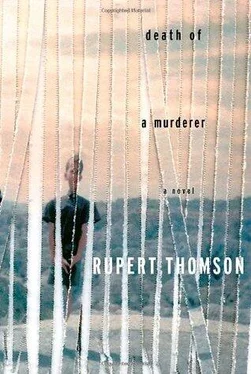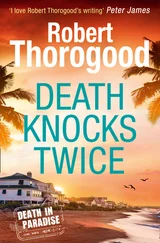Arms dangling, the man hung in front of a sideboard. His head wobbled slightly, as though mounted on a spring, and he was mumbling to himself. Billy couldn’t make out any of the words. Then, after what felt like an age, the man turned and saw them. His eyes widened behind his spectacles; his mouth fell open.
“Time to leave,” Raymond said.
But somehow they couldn’t even take a step. It was as if they were being told a story, and they wanted to hear more.
The old man staggered towards them. He was shouting, but all the sounds that came out of him were slurred and nasal, and both his ears were full of hair. It was horrible. Just then, a wailing started up, very loud yet strangely forlorn, and it took Billy a moment to realise that it was a siren at one of the chemical plants. They would go off as part of a practice drill, or when a shift ended, but sometimes it meant that an accident had happened. If there was a leak, you had to run as fast as you could into the wind. Raymond had told him that, and he’d got it from his father. Billy wondered which way you were supposed to run if there wasn’t any wind.
The noise seemed to trigger something in the old man. He grabbed a walking stick from the back of a chair and began to lash out in all directions. Swish — swish — swish. He didn’t appear to be attacking anything in particular, unless it was the air itself — or perhaps he was signalling his outrage at the presence of intruders. In any case, he was destroying the room. First a chintzy table-lamp went flying, then a shelf of bric-àbrac. The head snapped off a prancing china horse. A shell-shaped ashtray shattered. Billy watched, half-enthralled, as the stick’s black rubber tip arced through the centre light. The shade exploded, and bits of cloudy glass bounced like hail on the carpet.
By now, Raymond had slipped out of the room. Eluding the stick’s wild orbits, Billy followed. Through a half-open door he saw an old woman with thick glasses and very little hair. She was watching Wacky Races. When she spotted Billy in the doorway, she waved, not with her whole hand, just with her fingers.
Raymond and Billy cycled back over the level crossing and up the hill, not stopping at all until they reached the park. One foot on the ground and the other on a pedal, Billy could taste blood in his mouth, and his right side ached, but it felt good to be outside again. There had been almost no air in the house, and what there was had smelt unpleasantly sweet, like stale cake.
When they had got their breath back, Raymond offered Billy one of the fivers.
Billy shook his head. “You’re all right.”
“Sure?” Raymond said.
Billy was looking back over his shoulder. “They were mad.”
“They were just old,” Raymond said.
That night, when Billy was cleaning his teeth, a tiny triangle of misty glass fell out of his hair and landed in the sink. He kept it in a matchbox for a while, not because it was precious, but as a reminder of something. He couldn’t have said what exactly.
He didn’t see Raymond after that, not for several weeks, and when school started again they both avoided each other. That year Raymond went around with an older boy called Derek Forbes. Billy took up judo.
He dreamt about Raymond, though. All the time.
On first arriving in the mortuary, Billy had had the impression of an orderly, efficient space, but the longer he spent in the room, the more damage and neglect he noticed. The shell-shaped doors were set in a plain wooden frame that was badly scarred, especially at a point about three feet off the floor. The doors themselves were marked as well: there were dozens of little dents, all in a cluster, and all roughly the same diameter. There were similar marks on the fridge doors, and at a similar height. He thought he knew why, and a brief inspection of the trolley at the far end of the room confirmed his suspicions. Its leading edge and sharp corners lined up perfectly with most of the marks and dents. Clearly the porters were none too careful when it came to wheeling bodies about. The work wouldn’t exactly be well paid, of course, but that was only part of the story. If you had a job in a hospital, you couldn’t allow yourself to be disturbed by all the illness and disease surrounding you. You had to go to the other extreme, affecting indifference at the very least, and, from the outside, that could look insensitive or even callous. Similar strategies came into play if you worked for the police. Walking back to the entrance, Billy touched the dents in one of the doors. Maybe, after all, he had something in common with that surly young porter. He still felt like thumping him, though.
He moved to his left, passing shelves of neatly folded shrouds. In the gap between the main bank of fridges and a fridge marked police bodies he found a mop, a bucket, two rolls of pale-blue paper towels and a yellow-plastic pyramid that said wet floor. There were also a couple of empty card-board boxes, one of which had the words return to mortuary scrawled across it. Here too there was evidence of carelessness or haste. All the various items had been piled on top of each other, higgledy-piggledy, and Billy imagined, for a moment, that his neighbours, the Gibsons, had been involved somehow. Their back patio was always a jumble of toys, most of them broken. In the garden a swing lay on its side, grass growing over it; the sandpit was half-full of rain-water, and green with mould. The Gibson family: they weren’t actually criminal, but they didn’t seem to know how to clear up after themselves, and they never showed any respect for anything — and then they went and got their knickers in a twist about a wind-chime…
Rounding a pillar, Billy found himself facing the fridge where the woman’s body was being kept. At some subconscious level, perhaps, this had been his intended destination all along. Now that he had arrived, though, he didn’t know why he was there, or what it was that he wanted to do. At last, he reached out and tested the handle, just as the sergeant had done a few hours earlier. It was still locked, of course. How could it not be? All the same, a flicker of disappointment went through him. She looked old. Older than sixty. Was he becoming morbid, voyeuristic, or was it his own sense of dislocation that he was grappling with? Ever since he had been left by himself in the mortuary, he had felt a little as if he were guarding a phantom, or the figment of someone’s imagination. He didn’t quite believe she was there. Perhaps he needed something that would anchor him in the experience, make it tangible. But wasn’t that exactly what all those journalists outside were saying? In the end, he didn’t think his urge to look in the fridge would bear too much examination. Do your job, he told himself. Just do your job. With the murderer’s head behind that sheet of metal, only inches from his knuckles…He remained motionless for several seconds, and then stepped back, the cold shape of the door-handle imprinted on the inside of his fingers.
Billy passed the narrow door that led to the toilet and shower room. On the wall was a cooling control panel and a boxed first-aid kit. Someone had added an “s” on to the end of the word “aid.” There was nothing precious about a mortuary. The only concession to feeling was the chapel of rest. Directly linked to the mortuary through the bare wooden doors behind his chair, it could also be accessed from the corridor outside, which allowed members of the public to avoid the unsightliness, the ruthless practicality, of death. He pushed the doors open and peered in. A simple icon hung near the bed where the deceased would be laid out. Close by was an orange settee with arms of pale wood. The walls were orange too, though lighter. For all its warm colours, the chapel of rest was as functional as any other part of the mortuary. You came here to pay your last respects, or sometimes, even more distressingly, to identify your next of kin. In this room people’s worst fears would become a reality, and the air was petrified, stale, glassy with shock. For many, this would be where the suffering began.
Читать дальше












